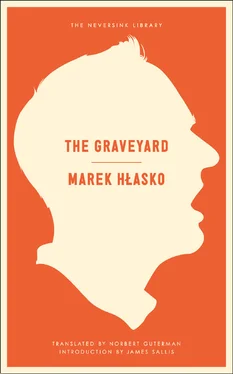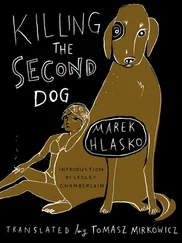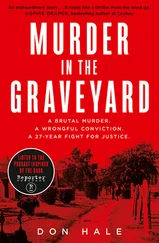The man in plain clothes turned to the lieutenant. “Is this the one?” he asked.
“Yes,” said the lieutenant.
“Citizen Lieutenant,” Franciszek said quickly, “please hurry up, I’d like to—”
“Let’s go,” said the man in plain clothes.
They banged the door right in his face, and once again he barely had time to jump back. The stranger with whom Franciszek had talked during the night let out a soft whistle. “So that’s what it is,” he said.
Franciszek turned to him. “What do you mean—‘that’s what it is’?”
His neighbor looked at him with gentle irony. “You must have made a fine mess for them to come after you like that,” he said. He smacked his tongue in a particularly repulsive way, then went on: “If you don’t remember what happened, you’re surely in for it. Someone must have informed on you. Don’t you remember?”
Franciszek looked at him sharply. “What are you talking about?”
The stranger smiled. “Someone must have informed on you,” he repeated. “Maybe you listen to Free Europe. You’d be in a bad way if it turned out that you listen to those broadcasts and then tell other people what you’ve heard. We’ve got one of those in here; he can tell you.” He called over his shoulder: “Mr. Kwiatuszynski, would you kindly come here for a minute?”
The bald-headed giant came up to them. “I’m listening,” he said in a splendid bass.
Franciszek’s neighbor turned to him. “You’re here because of Free Europe, aren’t you?”
“Nothing of the kind,” the giant said with great dignity. “I never listened to Free Europe. I was locked up for listening to Radio Madrid. My wife turned it on full blast, and the woman next door informed on us. It goes to show, you can never trust a woman.”
“It doesn’t matter,” Franciszek’s neighbor said, smiling triumphantly. “What matters is the fact itself, not the details. And Madrid is probably worse in this respect …”
“That’s not true,” said someone in the rear of the cell. “The worst is New York. They really hate us.”
“The Vatican is just as bad,” someone else threw in, coming closer. He was a small gray-haired man who looked like a retired teacher. “You’d think they’d apply different standards to a purely religious program, but nothing of the kind. The trouble my stepson got into for repeating a Vatican announcement — well, I wouldn’t wish it on anyone else. The name of a broadcasting station doesn’t prove anything. In such cases, my friends, everything is an illusion—”
Franciszek’s neighbor interrupted the argument with an impatient wave of his hand. “There’s no need to go into all that,” he said. “The main thing is that this gentleman here”—he pointed to Franciszek—“has been informed on, and he has absolutely no idea who it can be.” He leaned close to Franciszek’s ear. “Somebody in your family? You think the family is so wonderful? Well, we have somebody here because his mother-in-law reported he had a gun. She did it out of spite, because he didn’t ask her to his birthday party.”
“He isn’t here any longer,” the giant said in his splendid bass. “He was released yesterday.”
Franciszek cast a sharp glance at his neighbor. “Stop bothering me,” he said. “You offend me as a man and as a party member. I am honest, and the fact that I am here with you is just an unfortunate mistake. Please don’t talk to me like that, or I’ll tell the officer on duty what I think of you.”
His neighbor looked at him attentively. “What do you want of me?” he asked, shrugging his shoulders. “I haven’t said anything.”
Franciszek’s nerves, strained to the breaking point, this time refused to be controlled. He began to scream, his mouth foaming, his arms waving hysterically. “You haven’t said anything? All this time you’ve been saying the most disgusting things! Who do you think you’re talking to? I am a former partisan, and I didn’t fight through the whole occupation to hear people like you sneer at everything. I made a hash of people like you with my own hands in the underground. You offend everything I believe in and our country believes in! Do you understand?”
The man looked at him coldly. “I never said anything to you,” he said. “Do you hear me? I didn’t speak to you. It’s you who have been bothering me.”
“I? I bothered you?” Franciszek choked.
The man turned to the others. “Have I said anything to this gentleman?” he asked very loudly and calmly.
There was a moment’s silence, then the bald-headed giant said softly to Franciszek, “The gentleman said nothing.”
“What do you mean?” Franciszek was indignant. He was trembling, and beads of sweat appeared on his forehead. “Didn’t he drivel about denunciations, and so on?”
“You’re raving,” said the bald man, and gave Franciszek a light push on the chest. “Everything’s got mixed up in your head, my friend. I myself heard you say you’d like to make a dash for the West, that you’d be better off there. Do you remember that or don’t you? Everybody here heard you say it!”
“Who did?” Franciszek cried. He turned violently to the others. “Who heard me say that?”
For a moment there was complete silence. Franciszek breathed heavily. He felt the sweat streaming down his body, causing an intolerable itch.
“All of us,” the cell replied.
The bald man added: “And don’t you try to bother anyone. You were very drunk, and you don’t remember what you said last night. If I were to repeat it, you’d be in serious trouble. If you know what’s good for you, keep quiet.”
Franciszek stepped back. Hatred cast a mist over his eyes; he crouched, ready to spring at the bald giant, but at that moment the door creaked again, and Franciszek automatically turned his head.
“Kowalski,” the lieutenant said. “Come along.”
He was led down the corridor, to the room where he had been taken the previous night. Now, in daylight, it looked even grayer and uglier than before, when it was lighted by a bright, unshaded bulb hanging in the middle of the ceiling. At the desk the corporal’s seat was occupied by the round-faced man in plain clothes. Next to him was the sergeant who had escorted him to the police station. He looked very tired; his young face was pale, and he had rings under his eyes. The three of them — the lieutenant, the man in plain clothes, and the sergeant — were unshaven; during the night the sergeant’s round cheeks had grown as downy as ripe peaches, and neither his uniform nor his heavy gun added to his dignity.
The man in civilian clothes raised his eyes from the papers spread on the desk. “Well, Kowalski, here you are.” His voice expressed sincere worry. “It looks bad for you.”
Franciszek was silent; frowning, he leaned against the railing, and looked at the man in plain clothes.
“Bad,” the other repeated. Then, shaking his head, “You’re really in hot water.”
“What the devil have I done?” Franciszek asked.
“What’s the matter, aren’t you satisfied?” the lieutenant asked. Pushing out his chin, he stared at Franciszek with the expression of a little boy getting ready to fight.
“I want to know what I have done,” Franciszek said.
“And I want you to tell me,” the lieutenant said, “whether you like it or not.”
“Yes,” the sergeant threw in, “tell us: Don’t you like it? What? Do you like it or don’t you?”
“A party member,” said the man in plain clothes, spreading his hands. “A former partisan, an officer, and — well? Just to look at you, Kowalski, one would say you’re decent, quiet, probably a good comrade. But when we probe deeper, we find an enemy. You’ve unmasked yourself, Kowalski …” He gave the pile of papers a push. “That’s the way it looks,” he said. “You’ve unmasked yourself, and that’s that.”
Читать дальше






![Ричард Деминг - Whistle Past the Graveyard [= Give the Girl a Gun]](/books/412176/richard-deming-whistle-past-the-graveyard-give-t-thumb.webp)


